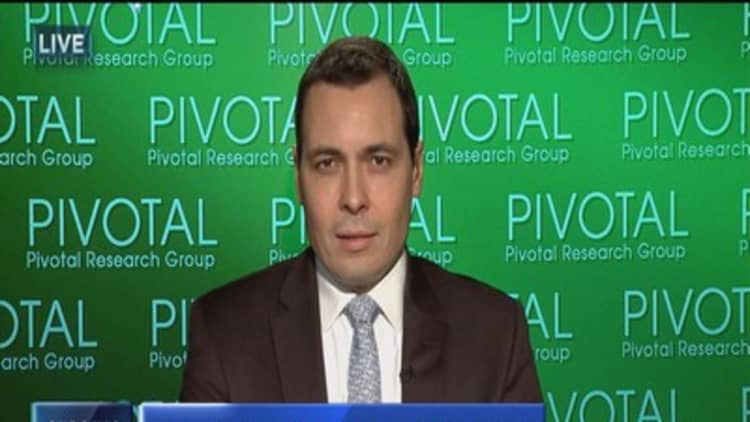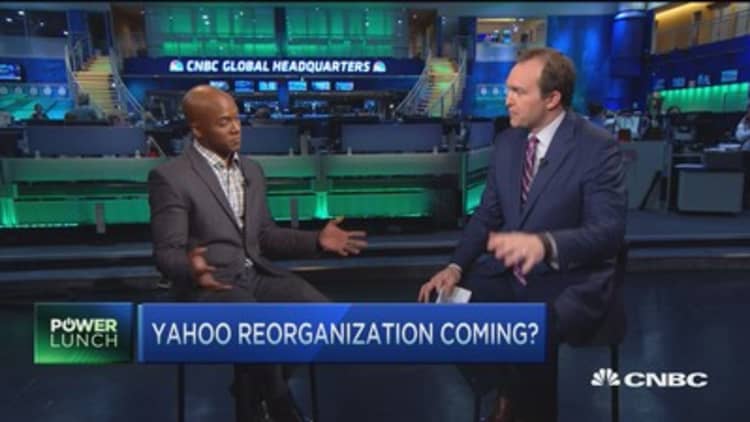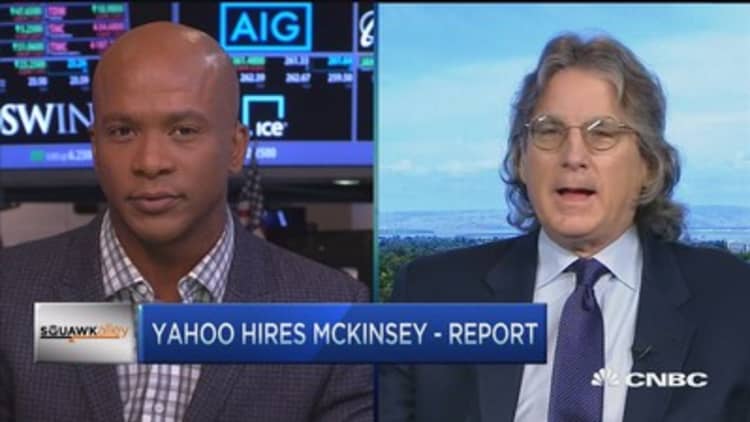



Yahoo may have the revenue and scale to make a comeback, but increasingly, experts are questioning whether it is missing a key ingredient: Human capital.
Investors woke up to unsettling news Monday, after Yahoo hired global management consulting firm McKinsey & Co. to help the company decide which units to shutter, sources told Re/code. And amid an ongoing flight of top executives, CEO Marissa Mayer is asking key staffers to commit to several years at the company, sources told Re/code.
"Yahoo's situation has been very difficult for a decade," Roger McNamee, co-founder of Elevation Partners, told CNBC on Monday. "There's a classic problem you see in management you see across the whole economy, where companies reach a certain scale, and then they are convinced that when they want to do something new, they can't invent it, they have to buy it, because it takes too long to create something from new and they want to have immediate impact. At this point, there's nothing they can do to salvage this situation."
At least 12 top-level staff have left this year, up from four last year, SunTrust Robinson estimates. The departures included Chief Development Officer Jackie Reses, Chief of Information Security Alex Stamos, CIO Mike Kail and CMO Kathy Savitt, the Oct. 19 note said.
Yahoo is far from the first large technology company to stir investors with executive departures. But Yahoo's shake-up may be more meaningful than the rest, because scrutiny over the high-level churn may make a revamp harder, experts told CNBC.
"I think the fact that she's hiring McKinsey doesn't speak well of her ability or the board's ability to turn the business around themselves," Youssef Squali of Cantor Fitzgerald told CNBC. "This is really the longest honeymoon period I can think of of any CEO in Silicon Valley. She's been on the job for three and a half years, and we've been waiting for a turnaround. Yet, you look at the P&L, organic growth is nonexistent and the margins are flat."
Snapchat, Google and VMWare all made headlines in the past year for an exodus of notable staff: Snapchat lost staffers to relocation issues and changes in the company's strategy; Google parted with two leaders of its delivery service Google Express; and EMC cast off leadership at VMWare, according to multiple media reports.
But the companies' strategies quickly became clear. Snapchat pulled the plug on its original programming, Google announced a partnership with Whole Foods and EMC merged with Dell.
Yahoo, on the other hand, is still steeped in years of turnaround strategy with no end in sight. And stoking the uncertainty is a series of hiring flops, despite Mayer's reputation of reviewing every applicants' resume, as Business Insider reported in 2012. Shares of the company are down about 32 percent over the past year.
The pattern of executive departures has left the market wondering if more changes are to come, and brought chatter that a leadership change may be needed at the top if Yahoo fails to gain traction, analyst Robert Peck of SunTrust Robinson Humphrey wrote in the Oct. 19 note. Peck has actively tracked the issue over several years, giving Mayer a "C" grade for her management of talent.
If Yahoo's future is as unclear internally, it could hurt retention of remaining staff, tech recruiters and management experts said. With a drought of top talent in Silicon Valley, Yahoo may get a reputation as a leaky pipe.
"I think when you want to retains staff, what you need to do is to demonstrate what their future is within that organization," said technology HR expert Lars Schmidt of Amplify Talent. "You can't do it by making threats if they leave. It makes talent wonder what's really going on, and if there are issues they may not know about."
A contract or retention bonus — rather than just a pledge of loyalty — would be a better incentive for employee retention, said Michael Solomon, co-founder of 10x Management. Plus, there are many cost-free perks, like flexible work time and stock options, that can be packaged in a way to entice different employees.
"There's a shortage of talented people in technology— and it's not changing," Solomon said. "If you create an environment where more is being asked than offered, there is no interdependent relationship. Certainly, it's not an encouragement for people to think it's a fun, great place to work."
McKinsey declined to comment. Yahoo did not respond to CNBC's request for comment, but Mayer commented on the the churn of top staff in Yahoo's most recent earnings call.
"The design and changes in Yahoo's leadership team are the result of careful planning to achieve the necessary skills, passion and the ability to execute growth in our business," Mayer said, according to a transcript by The Street.
Mayer's comments imply that the changes in leadership are intended to be functional, where employees are replaced with workers better-positioned for their role. But whether top-level leadership leaves voluntarily or not, the result can often be dysfunctional, said James Guthrie, professor of business at the University of Kansas.
Guthrie said companies tend to underestimate the costs of turnover, which can cost can be two to three times annual salary of that person, especially in knowledge-intensive fields, Guthrie said. Plus, there is tacit knowledge of a company's idiosyncrasies and social capital of relationships that are lost in the transition — and can't be replaced by a white knight from the outside.
"Changes at the top don't really make people believe in your mission and values to get things done," Guthrie said. "That is done day by day, through hard work."
Transparency can help ease that process, said Paul McDonald of Robert Half, which specializes in the placement of professionals in the accounting and finance, technology, legal, creative and administrative fields. Though he declined to comment on Yahoo specifically, he said it's important for organizations to prevent the rumor mill from taking over employee morale.
"In over three decades in the people business, what we've seen organizations do is being really upfront and honest," McDonald said. "If a strategy follows up the 'facts of life' speech, employees are going to appreciate that."
UPDATE: After this story published. EMC confirmed that VMWare chief strategist Chuck Hollis and EMC Chief Marketing Officer Jonathan Martin, left the company this year.
Disclosure: Yahoo has an investment banking relationship with Cantor Fitzgerald. CNBC's parent NBC Universal is an investor in Re/code's parent Revere Digital, and the companies have a content-sharing arrangement.





